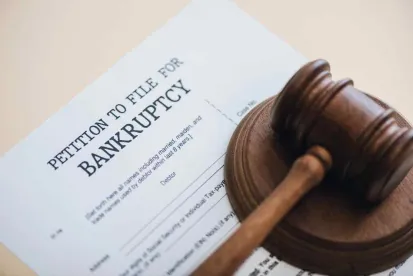The U.S. Supreme Court ruled on Thursday that because Indian tribes are indisputably governments, the Bankruptcy Code unmistakably abrogates their sovereign immunity to bankruptcy court proceedings.
In an 8-1 decision, the Court found that when Congress abrogates tribal sovereign immunity, it must do so through a clear statement of congressional intent. Lac du Flambeau Band of Lake Superior Chippewa Indians, et al. v. Coughlin, Case No. 22-227, slip op. at 4 (June 15, 2023) (“Coughlin”). While this is a demanding standard, the Court held that the rule is not a “magic-words” requirement. Id. The Court found the standard was met in part based upon the specific text and structure of the definition of “governmental unit” in the Bankruptcy Code (the “Code”). Id. at 5.
At issue in the case was whether a debtor in bankruptcy, Brian Coughlin, can enforce the Code’s automatic stay protections against a short-term lending company wholly owned by a Wisconsin tribe to prevent alleged collection efforts by the tribal company. In reaching its decision, the Court settled a split among the Courts of Appeals for the Ninth and First Circuits on the one hand and the Court of Appeals for the Sixth Circuit on the other hand, siding with the Ninth and First Circuits that 11 U.S.C. § 106(a) of the Code abrogates the sovereign immunity of federally recognized Indian tribes and subjects tribes to certain bankruptcy proceedings specified in the Code. Prior to the Court’s Coughlin decision, in a case where a bankruptcy trustee sought to recover alleged fraudulent transfers by a bankrupt commercial casino on behalf of and to a federally recognized tribe, the Court of Appeals for the Sixth Circuit determined that the Code did not abrogate tribal sovereign immunity. See In re Greektown Holdings, LLC, 917 F.3d 451 (6th Cir. 2019).
Under section 106(a) of the Code, Congress abrogated the sovereign immunity of “governmental units” for more than 50 Code provisions, including the automatic stay intended to stop debt collection while a bankruptcy case proceeds. The term “governmental unit” is defined in section 101(27) of the Code as the:
United States; State; Commonwealth; District; Territory; municipality; foreign state; department, agency, or instrumentality of the United States (but not a United States trustee while serving as a trustee in a case under this title), a State, a Commonwealth, a District, a Territory, a municipality, or a foreign state; or other foreign or domestic government.
The Court interpreted this definition of “governmental unit” and especially the “catchall” phrase of “foreign or domestic government” as evidence of Congress’ intent to broadly waive the sovereign immunity of any government with respect to the proceedings and actions identified in section 106(a). Id. at 6. The Court also found that the Code’s policy goal of providing a comprehensive and orderly system of debt relief is better served by avoiding a carve-out of tribal governments from the comprehensive definition of section 101(a). Id. at 8.
Now that the Court has settled the prior split among the various U.S. Courts of Appeal by holding that the Code unequivocally abrogates the sovereign immunity of tribes, the Coughlin decision means that tribes can be compelled to appear and participate in bankruptcy proceedings as a third party, be targeted by a trustee seeking to recover money paid to the tribe by a debtor, be prohibited from evicting a lessee of tribal lands due to the automatic stay, or be subject to a debtor’s confirmed bankruptcy plan, including terms of a plan that might negatively impact a tribe’s rights under a lease. As governments subject to budgetary limitations and restraints, the possibility that a bankruptcy trustee can compel a tribe to return money or assets to a bankruptcy estate will have far-reaching financial implications for a tribe.
Tribes located within the jurisdiction of the Court of Appeals for the Ninth Circuit have been addressing the real life implications of the issues addressed in the Court’s Coughlin decision since the Krystal Energy decision in 2004. Parties can look to the experiences of tribes, debtors and creditors in bankruptcy proceedings in the U.S. Bankruptcy Courts for the districts within the Ninth Circuit to better understand the types of bankruptcy proceedings into which tribes should now expect to be subject. To prepare for the impact of the Court’s Coughlin decision, tribes nationwide will be well served to consider including additional funds and reserves in their budgets to address the litigation costs of potential bankruptcy proceedings and to invest resources in training and educational programs to comprehensively understand how to legally prepare for potential bankruptcy related litigation.
The Court’s decision did not address the eligibility of tribes to file for bankruptcy as debtors, as that question was not before the Court. Governmental units (other than some municipalities) may not be debtors eligible for bankruptcy protections because they are excluded from the definition of “person” under the Code, except under several limited exceptions. See 11 U.S.C. § 109 (only a “person” or “municipality” may be a debtor under the Bankruptcy Code); 11 U.S.C. § 101(41). Consequently, the Court’s holding that federally recognized Indian tribes are “governmental units” supports the presumption that a tribe itself is ineligible to file for debt relief under the Code. Such a presumption limits the ability of tribes to reorganize their commercial operations through an established regime that is open to other commercial enterprises. Non-tribal commercial entities in a Chapter 11 reorganization have the ability to obtain some level of debt relief and certainty. Instead, financially distressed tribes and their creditors often have to engage in complicated, costly and time-consuming out-of-court restructurings, without any of the protections or rules afforded debtors under the Code. Moreover, uncertainty remains for businesses wholly owned by tribes and organized under tribal law.
The Coughlin decision also has implications for the interpretation of other federal statutes. Although the Court was at pains to state that the standard to find a waiver of sovereign immunity was demanding, see, e.g. slip op.at 4, lower courts now have precedent to find other ways in which a federal statute that does not mention the word “tribe” could waive tribal sovereign immunity. For example, the Fair and Accurate Credit Transaction Act (“FACTA”) defines a person as “any individual, partnership, corporation, trust, estate, cooperative, association, government or governmental subdivision or agency, or other entity.” FACTA prohibits any “person” from printing certain credit card information on receipts provided to the cardholder at a point of the sale or transaction. In a FACTA class action case brought by a claimant against the Oneida Indian Tribe of Indians in Wisconsin, the Seventh Circuit upheld the Oneida Tribe’s defense of sovereign immunity holding that Congress did not unequivocally abrogate the sovereign immunity of tribes in FACTA, Meyers v. Oneida Tribe of Indians of Wisconsin, 836 F.3rd 818 (7th Cir. 2016). If a similar case were brought now against a tribe, a court could reach a different conclusion based on the Supreme Court’s decision, exposing tribal governments and their wholly owned tribal businesses to class action suits under FACTA.
Thus, the implications of the Coughlin decision are potentially far reaching and tribes will need to carefully consider the possible issues that will come up in the future in order to plan how to best protect their communities and governmental assets while also pursuing their economic development plans.



 />i
/>i

